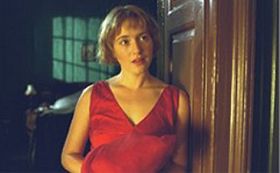
The author as a young woman. Kate Winslet is Iris Murdoch
dir Richard Eyre
scr Richard Eyre, Charles Wood
with Judi Dench, Jim Broadbent, Kate Winslet, Hugh Bonneville, Penelope Wilton, Samuel West, Timothy West, Kris Marshall, Saira Todd, Juliet Howland, Eleanor Bron, Joan Bakewell
release US 14.Dec.01; UK 18.Jan.02
Miramax-BBC
01/UK 1h30

 The life of novelist-philosopher Iris Murdoch becomes an artful examination of happiness and love--two of Murdoch's recurring themes--in this lyrical film by London theatre director Richard Eyre. Murdoch's life is told in two parallel stories: As a young woman (Winslet), she's a bright spark who falls for the unlikely John Bayley (Bonneville) while still seeing other men (and maybe women?) on the side. And at the other end of their life together, Murdoch (Dench) and Bayley (Broadbent) are forced to confront the realities of her Alzheimer's--especially cruel because of Murdoch's fierce intellect and Bayley's complete reliance on her.
The life of novelist-philosopher Iris Murdoch becomes an artful examination of happiness and love--two of Murdoch's recurring themes--in this lyrical film by London theatre director Richard Eyre. Murdoch's life is told in two parallel stories: As a young woman (Winslet), she's a bright spark who falls for the unlikely John Bayley (Bonneville) while still seeing other men (and maybe women?) on the side. And at the other end of their life together, Murdoch (Dench) and Bayley (Broadbent) are forced to confront the realities of her Alzheimer's--especially cruel because of Murdoch's fierce intellect and Bayley's complete reliance on her.
The raw honesty here is profoundly moving, drawing us into the characters with their quick wits and sharp minds, and then getting deeper beneath the surface at two points in their lives. Despite the chillingly serious issues, the film never gets sentimental (although James Horner's violin-intensive score is a bit sticky at times). Instead it faces the facts head on, with edgy humour and challenging dialog. Dench is equally unsentimental, showing Murdoch's steady decline with an intriguing combination of dignity and chaos. While Winslet is open and earthy as the younger woman whose career is all in front of her. But it's Broadbent who steals the show with a performance of such complexity that it takes your breath away--he's at once a babbling fool, a doting husband and a brainy academic. (And to be fair, Bonneville is equally spot-on as the younger Bayley, dealing with his own mind-spinning issues.) There's also a nifty bit of casting that has West father and son playing younger and older versions of one of Iris' boyfriends. But this time-hopping structure never becomes gimmicky; some of the edits are a bit obvious, but they are also meaningful and telling. And while this is an important film on two major levels--as a bio of Murdoch and as an examination of dementia--its real power lies in the way it speaks to our hearts about love.
| adult themes and situations, nudity, language |

| 11.Dec.01 |
 "I don't think I have ever seen a film with such superb casting. All four main characters (young/old John Bayley, young/old Iris) were more than just believable ... they almost made me forget I was watching a film. All four of them seemed to perfectly 'catch' that extraordinary relationship that the couple shared. Judi Dench's portrayal of Iris's decline into dementia was heartbreaking, but not over-sentimental. Jim Broadbent's portrayal of her loving yet frustrated husband was really powerful. I came away from this film absolutely amazed. I knew it would be good, but it was better than I expected. It's not just about Iris's tragic end, but it also tells an enduring love story - a meeting of minds - too. Could this be Judi Dench's next Oscar?" --Jo Caswell, West Sussex 14.Feb.02
"I don't think I have ever seen a film with such superb casting. All four main characters (young/old John Bayley, young/old Iris) were more than just believable ... they almost made me forget I was watching a film. All four of them seemed to perfectly 'catch' that extraordinary relationship that the couple shared. Judi Dench's portrayal of Iris's decline into dementia was heartbreaking, but not over-sentimental. Jim Broadbent's portrayal of her loving yet frustrated husband was really powerful. I came away from this film absolutely amazed. I knew it would be good, but it was better than I expected. It's not just about Iris's tragic end, but it also tells an enduring love story - a meeting of minds - too. Could this be Judi Dench's next Oscar?" --Jo Caswell, West Sussex 14.Feb.02

"At the end I was emotionally exhausted and totally moved. Such a story of enduring love and interdependence between two people throughout their lives is a lesson to all of us today. I felt priveleged to have seen this film and thankful for the insight into the philosophy of Iris Murdoch. The fact that beforehand my wife and I had been wrestling with what second-hand car to buy seemed totally meaningless afterwards." --Ian Montgomery, Gloucestershire 19.Feb.02